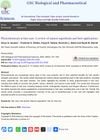 12 citations,
April 2016 in “Chinese Medicine”
12 citations,
April 2016 in “Chinese Medicine” The research identified 12 antioxidant compounds in Polygonum multiflorum roots, suggesting these as quality markers for the plant's processed roots.
[object Object]  5 citations,
October 2022 in “Frontiers in bioengineering and biotechnology”
5 citations,
October 2022 in “Frontiers in bioengineering and biotechnology” Ro stress hindered ginseng root growth and ginsenoside production, but increased certain hormones and affected gene regulation related to plant growth and stress responses.
 2 citations,
June 2023 in “Food science & nutrition”
2 citations,
June 2023 in “Food science & nutrition” Eating apples can help prevent heart disease, cancer, and other conditions because they have healthy plant chemicals.
 2 citations,
August 2010 in “Journal of Scientific Research”
2 citations,
August 2010 in “Journal of Scientific Research” The study found specific shape, size, and cellular details of Tridax procumbens leaves that can help identify the plant.

Bee pollen, green tea, essential oils, and various plant extracts improve skin and hair health.

Self-monitoring blood pressure in pregnant women didn't improve outcomes, diabetes drugs may increase gallbladder disease risk, a new drug helps severe hair loss, a plant-based COVID-19 vaccine is 69.5% effective, and new anticoagulants are safer for diabetics with heart rhythm issues than warfarin.
 February 2014 in “Harvard University Press eBooks”
February 2014 in “Harvard University Press eBooks” The document describes how hair and plants are symbolically linked in Indo-European traditions, leading to practices like burying hair to promote plant growth and using plants to treat baldness.
 December 2008 in “Enzyme and Microbial Technology”
December 2008 in “Enzyme and Microbial Technology” New patents include innovations in skin and hair care, disease treatment, plant stress tolerance, and protein purification.
 November 2007 in “Journal of Generic Medicines”
November 2007 in “Journal of Generic Medicines” Europe strengthened medicine regulations, increased protection against counterfeit drugs, and made it tougher to challenge comparative advertising, while also focusing on patent law enforcement and updating plant protection rules.
466 citations,
June 2009 in “Experimental dermatology” We now understand more about what causes acne and this could lead to better, more personalized treatments.
 138 citations,
July 2015 in “Clinical, Cosmetic and Investigational Dermatology”
138 citations,
July 2015 in “Clinical, Cosmetic and Investigational Dermatology” Eating less sugar, milk, and saturated fats and more vegetables and fish may help treat and prevent acne.
 41 citations,
July 2015 in “Current Drug Discovery Technologies”
41 citations,
July 2015 in “Current Drug Discovery Technologies” Some plants may help with hair growth and have fewer side effects than synthetic drugs, but more research is needed to confirm their effectiveness.
 16 citations,
December 2018 in “Plant Science”
16 citations,
December 2018 in “Plant Science” Elevated CO2 can lessen the negative impact of water shortage on soybean roots and affects specific genes.
 12 citations,
November 2017 in “Archives of Dermatological Research”
12 citations,
November 2017 in “Archives of Dermatological Research” Mediterranean diet with fresh herbs and vegetables lowers male hair loss risk.
 11 citations,
January 2023 in “BioMed Research International”
11 citations,
January 2023 in “BioMed Research International” Microbial biosurfactants could be a safer and environmentally friendly alternative to chemical surfactants in cosmetics.
 11 citations,
November 2021 in “Clinical, Cosmetic and Investigational Dermatology”
11 citations,
November 2021 in “Clinical, Cosmetic and Investigational Dermatology” Resveratrol may help hair grow, but more research is needed.
 7 citations,
June 2021 in “Trends in Food Science and Technology”
7 citations,
June 2021 in “Trends in Food Science and Technology” Western diet may cause male pattern baldness; low glycemic diet with magnesium could help.
5 citations,
December 2023 in “Materials” Organic and biogenic nanocarriers can improve drug delivery but face challenges like consistency and safety.
 5 citations,
January 2012 in “Hair therapy & transplantation”
5 citations,
January 2012 in “Hair therapy & transplantation” Hair mesotherapy might help with certain types of hair loss but lacks strong scientific proof and has some risks.
 5 citations,
February 2011 in “Expert Opinion on Drug Discovery”
5 citations,
February 2011 in “Expert Opinion on Drug Discovery” We need better treatments for hair loss, and while test-tube methods are helpful, they can't fully replace animal tests for evaluating new hair growth treatments.
 3 citations,
December 2018 in “PubMed”
3 citations,
December 2018 in “PubMed” Most over-the-counter hair loss treatments lack strong evidence of effectiveness and are not FDA-approved.
 3 citations,
February 2015 in “Scientific Research and Essays”
3 citations,
February 2015 in “Scientific Research and Essays” The study showed that brown planaria can be used to cheaply test if local plants can stop cell growth.
 2 citations,
July 2023 in “Agronomy”
2 citations,
July 2023 in “Agronomy” Melatonin helps wheat plants resist drought by improving their root and root hair growth.
 2 citations,
December 2021 in “ScienceRise”
2 citations,
December 2021 in “ScienceRise” The best way to extract oil from Urtica dioica roots is by using corn oil, a 1:5 ratio of raw material to extract, extracting for 6 hours, and using the maceration method.
1 citations,
February 2024 in “Diversity” African plants can treat hair issues and may help with diabetes.
 1 citations,
July 2022 in “Plant Cell, Tissue and Organ Culture (PCTOC)”
1 citations,
July 2022 in “Plant Cell, Tissue and Organ Culture (PCTOC)” The study found that in Eclipta prostrata roots, coumestans come from acetate and shikimate pathways, and phenylpropanoid is made only through the shikimate pathway.
[object Object]  1 citations,
January 2021 in “Research, Society and Development”
1 citations,
January 2021 in “Research, Society and Development” Vegetable oils rich in antioxidants may help prevent skin aging caused by free radicals.
 December 2024 in “Plant Science Today”
December 2024 in “Plant Science Today” Phyla nodiflora contains compounds that may help treat diabetes, alopecia, cancer, and anti-diuresis.
 December 2024 in “Planta Medica”
December 2024 in “Planta Medica” Certain plants may help hair growth in alopecia.
 November 2024 in “GSC Biological and Pharmaceutical Sciences”
November 2024 in “GSC Biological and Pharmaceutical Sciences” Phytochemicals from plants can improve hair growth, strength, and scalp health.


























